七年级英语Jobs people do教案1
七年级秋季班-第8讲Unit 4 Jobs people do1教案

Unit 4 Jobs people doB: A travel agency.A: 3 Have you traveled a lot?B: Yes, I have been to a few places.A: Have you been to Europe?B: 4 There's nothing I like more than traveling. What about you?A: Oh, I really want to take a trip to Paris.B: There are lots of historical places of interest there. 5A: Thanks a lot.B: Not at all. 6A: As soon as I can find a place to live. I like this beautiful town.B.TrueorFalse(判断下列句子是否符合短文内容,符合的用“T”表示,不符合的用“F”表示)We are all busy talking about and using the Internet (互联网), but how many of us know the history of the Internet?Many people are surprised when they find that the Internet was set up in the 1960s. At that time, computers were large and expensive. Computer networks (网络) didn't work well. If one computer in the network broke down, then the whole network stopped. So a new network system had to be set up. It should be good enough to be used by many different computers. If part of the network was not working, information could be sent through another part. In this way computer network system would keep on working all the time.At first the Internet was only used by the government, but, in the early 1970s, universities, hospitals and banks were allowed to use it too. However, computers were still very expensive and the Internet was difficult to use. By the start of the 1990s, computers became cheaper and easier to use. Scientists had also developed softwares that made "surfing" (浏览) the Internet more convenient.Today it is easy to get online (上网) and it is said that millions of people use the Internet every day. Sending e-mails is more and more popular among students.The Internet has now become one of the most important parts of people's life.1.The Internet has a history of less than thirty years.2.In the 1960s computer networks went wrong easily.puters become cheaper so that many hospitals and banks were allowed to use them.4.People didn't have enough software to get on-line conveniently until the early 1990s.5.Students like sending e-mail very much.C. Choose the best answer (根据短文内容,选择最恰当的答案):Mr. and Mrs. Turner live outside a small town. They have a big farm and they are always busy working on it. Their son, Peter, studied at a middle school. The young man studied hard and did well in his lessons. It made them happy.Last month Peter finished middle school and passed the entrance examination (升学考试). Mrs. Turner was very happy and told the farmers about it.Yesterday morning the woman went to the town to buy something for her son. On the bus she told one of her friends how clever and able her son was. She spoke very loudly. All the people inthe bus began to listen to her."Which university (大学) will your son study in?" a woman next to her asked."In the most famous university in our country!" Mrs. Turner said happily."The most famous university?""Oxford University (牛津)"Most of the passengers(乘客) looked at her carefully. Some of them said to her, "Congratulations!"A woman said, "I'm sure he'll know Fred Smith.""Who's Fred Smith?""He's my son.""Does he study in the university, too?""No," said the woman. "He is one of the professors."1.The story happened in ____________ .A. AmericaB. FranceC. GermanyD. England2. Mr. and Mrs. Turner were happy because _______________ .A. their son did well in his lessonsB. they have a big farmC. they have a good harvestD. their son studied at a middle school3. Mrs. Turner wanted everyone to know ______________ .A. her son finished middle schoolB. her son was handsomeC. her son was going to study in a universityD. her son was very friendly to others4. Mrs. Turner spoke so loudly in the bus that _________________ .A. her friend could hear herB. all the people could hear herC. she hoped to make all the people happyD. she hoped they would say congratulations to her5. Which of the following is true?A. The woman wasn't interested in Mrs. Turner's words.B. Mrs. Turner knew nothing about the famous universityC. The woman wanted to stop Mrs. Turner from showing off (炫耀).D. The woman next to Mrs. Turner wanted to show off her son, too.D. Read the passage and answer the following questions (根据短文内容,回答下列问题);If you go to visit London, you'll see a lot of buses and cars on the road. You'll also see a lot of bikes because more and more people travel by bike.There are a lot of reasons for this. First, it is very cheap to buy a bike, and it's quick too. You often have to wait for a bus for half an hour. When the bus comes, there are so many other buses and cars on the roads that the bus moves very slowly.I traveled to work by bus for about four years. I often arrived at work late and tired. Then one day, about two years ago, a friend of mine said, "I go to work by bike. Why don't we travel together?""Because my bike is old," I answered, "and there are so many buses and cars on the roads. I'll feel frightened ...""You needn't feel frightened!" said my friend. "If you follow me and ride slowly, you'll be fine."The next day I bought myself a new bike. Although we went slowly, we arrived at work quickly. It took 40 minutes to go by bus, but only half an hour by bike.Now I don't feel afraid. I love going to work by bike. I take a different road every day. I arrived at work quickly, and moreMy dream in the futureI want to be a teacher in the future. When I was young, many good teachers not only taught me how to study but also taught me how to be a kind man. We should show our sense of responsibility. So I am always ready for helping others. I am learning more knowledge, doing much exercise to keep healthy. I think I'll be a good teacher just as my teachers.Step 6: Summary.What did you learn today?Could you tell me something about our lessons?Please let me know your opinions about it and I will do my best to perfect it .Thanks!Step 7: Homework.I. Read and choose the best answer.( ) 1. We need to buy two ___________ for our new flat.A. furnituresB. piece of furnitureC. furnitureD. pieces of furniture( ) 2. This kind of material ______________ easily, so don't smoke here.A. catches fireB. on fireC. gets fireD. brings fire( )3. My father is a wonderful _______________ in our town.A. cooksB. cookerC. cookingD. cook( )4. The box is very heavy, so we'd_______________ better carry it downstairs .A. by liftB. on liftC. in liftD. with lift( )5. L isa _______________ Tom want to be engineers in the future.A. Both; andB. Neither; norC. Both; orD. Either; or( )6. My job is to ________________ the telephone at night.A. receiveB. answerC. acceptD.get( )7. It takes the policeman two hours to_______________the big fire.A. be outB. be upC. put outD. put up( ) 8. After several months' hard work, the scientists_______________the pandas successfully.A. rescuedB. has rescuedC. are rescuingD. have been rescued【Keys】1-5 DADAA 6-8 BCAII. Rewrite the sentences as required.1.This room is as big as that one. (保持句意不变)This room is the______________as_____________ that one.2. I want to be a teacher because I love children very much. (对划线部分提问)______________ ______________ you want to be a teacher?3. My job is quite interesting. (对划线部分提问)_____________ _____________ your job?4. I plan to buy a pair of sports shoes for my son. (对划线部分提问)_____________ do you plan to buy for your son?5. Jackson put the newspaper on the table just now. (改为一般疑问句)______________ Jackson _____________ the newspaper on the table just now?【Keys】1. same size 2. Why do 3. How is 4. W hat 5. Did; putⅢ. Read the passage and judge if the sentences are TRUE or FALSE.Most people have jobs. They go to work nearly every day. Some people are lucky. Either they have very interesting jobs or they make a lot of money. Most people are not so lucky. Either their jobs are not very interesting or they don't make much money.The most interesting jobs are often the most difficult. People take a long time to learn how to do them. Doctors study for at least six years after finishing school. Some young people have interesting and high-pay jobs. Many young players do their work successfully. Football and tennis stars are usually under 35 years old. Older people usually cannot play these sports very well. They cannot move fast enough. Golf, however, is a good sport for older people. Many golf players are quite old, but they can play it successfully.Most people work until they are 60 or 65 years old. Then they retire and have a lot of free time. Some people never retire though. These people usually have very interesting jobs. Writers, artists, scientists and actors usually work until they die. Their work is their life.( )1. Most people don't go to work every day.( )2. Some people are lucky because they can find an interesting job and make lots of money.( )3. People have to take a long time to learn the difficult job.( )4. Older people usually still play football and tennis very well.( )5. All people get retired when they are 60 or 65 years old.【Keys】1-5 FTTFFⅣ. Read the passage and choose the best answer.When we ask students what they want to be, they often talk about usual jobs, things like teachers and doctors. But if you think about it, many people don't plan to do their jobs. They just start doing them by accident. We will talk about two people with unusual jobs.Emily is a dentist but she doesn't work with people. She works with horses. After university she took care of animals' health for several years, but she noticed that there were few people who could help horses' teeth. She decided to go to college and study again. Then she had to buy special tools, but she is never out of work. She'd always be very busy taking care of horses' teeth. "I couldn't be a dentist for people now," Emily said, " because I really enjoy working with horses. "As soon as David could read, he read books about robots, but the robots he builds today don't look like the strange robots people built in his books. He built robots for industry. Early one moming he made up his mind to study math, science and computers so that he could break into the world of robot engineering. " Some of the math is very difficult," said David, "but you must study math to be an engineer. " Fortunately he got top marks in all his math exams.( ) 1. Many people start doing their jobs_______________.A. on purposeB. by chanceC. when they've graduatedD. i ntentionally( )2. Emily doesn't want to be a dentist because_______________.A. the pay is lowB. she has to buy special toolsC. she will be out of workD. she likes working with horses( )3. To become a robot engineer, David______________ .A. needed to worryB. bought a lot of robotsC. had to study hardD. didn't have to go to college( )4. David got top marks in all his math exams, although______________.A. math was not easy to studyB. he had to study math to be an engineerC. he could break into the world of robot engineeringD. he made up his mind to study math, science and computers( )5. Which of the following is NOT right in the passage?A. Students often talk about usual jobs like teachers and doctors.B. Emily likes horses very much.C. David built robots for industry.D. David isn't good at maths.【Keys】1-5 BDCADⅤ. Read the passage and fill in the blanks with proper words.Tom was driving home from the station in his car yesterday evening when he had an a 1 .He was driving a 2 a main road at 50 kilometers an hour when a 3 car came out of a side road and hit his. There was a lot of damage to both cars, and both Tom and the other man, Mr Brown, were h 4 . One of Tom's arms was b 5 , and Mr Brown had a bad cut on his head.Another car was f 6 Tom's. It stopped quickly and a man and a woman got out of it. They ran to the damaged cars and pulled Tom and Mr Brown out of their cars because they thought, "Perhaps the gas in those cars will c 7 fire and burn the two men. "The man and the woman t 8 a doctor and the police. Soon a car a 9 and took the two men to hospital. Two policemen also arrived and began to measure things. F 10 , a truck came and pulled the two cars off the road.1. ___________2. __________3. ____________4.____________5._____________。
Unit 4 Jobs people do 教学课件1
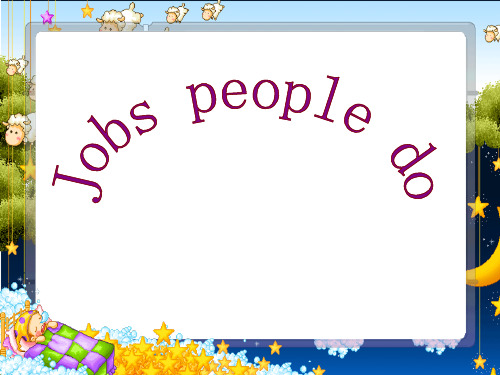
mechanic repair cars
A: What’s his/her …? B: He’s a mechanic. A: What does he/she usually …? B: He repairs cars.
architect draw plans of buildings
A: What’s …? B: She’s an architect. A: What does…? B: She draws plans of buildings
removal man move people’s furniture A: What’s …? B: He’s a removal man. A: What does…? B: He moves people’s furniture.
What’s his/her job? removal man mechanic secretary
architect
builder
What does he/she usually do?
architect
move people’s furniture
secretary
repair cars, vans and minibuder
build buildings
mechanic
draw plans of buildings
removal man
Where does an architect work?
An architect works in a construction company.
Check the answers
S1: Where does a doctor work? S2: A doctor works in a hospital.
牛津上海版七年级英语上册教学设计:Unit4Jobspeopledo
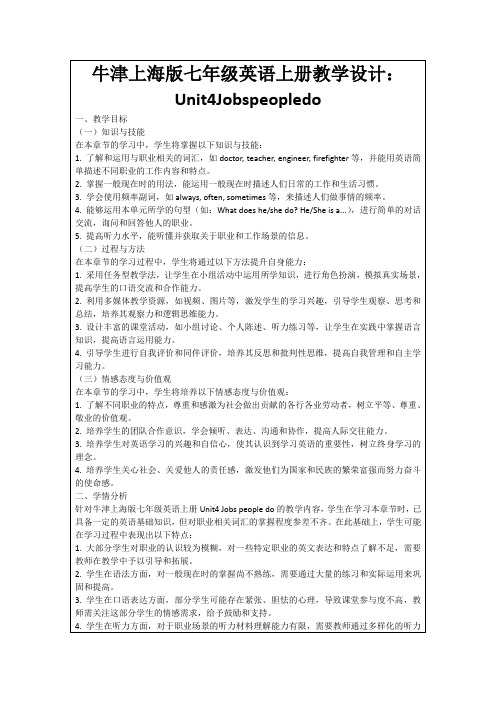
3.教师引导学生学习频率副词always, often, sometimes等,并在句子中进行实际运用,加深学生的理解。
4.教师讲解本单元的句型:“What does he/she do? He/She is a...”,并组织学生进行模拟对话,巩固所学知识。
1.大部分学生对职业的认识较为模糊,对一些特定职业的英文表达和特点了解不足,需要教师在教学中予以引导和拓展。
2.学生在语法方面,对一般现在时的掌握尚不熟练,需要通过大量的练习和实际运用来巩固和提高。
3.学生在口语表达方面,部分学生可能存在紧张、胆怯的心理,导致课堂参与度不高,教师需关注这部分学生的情感需求,给予鼓励和支持。
3.整合多媒体资源,如视频、图片等,丰富教学内容,激发学生的学习兴趣。同时,通过多媒体展示,让学生更直观地了解各种职业的工作场景。
4.设计分层作业,针对不同层次的学生,布置难易适度的作业,使每个学生都能在课后巩固所学知识,提高学习效果。
5.课后拓展活动:鼓励学生参加学校组织的职业体验活动,实地了解各种职业,将所学知识与社会实践相结合。
(三)学生小组讨论
1.教师将学生分成小组,每组选择一个职业进行讨论,探讨该职业的工作内容、工作环境、需要的技能等。
2.各小组用英语进行讨论,鼓励学生积极参与,提高口语表达能力。
3.讨论结束后,各小组向全班汇报讨论成果,教师进行点评和指导。
(四)课堂练习
1.教师设计一系列课堂练习,如填空、选择、连线等,让学生运用本节课所学知识,巩固职业词汇和一般现在时的用法。
6.教学评价:采用多元化的评价方式,包括课堂表现、作业完成情况、听力测试、口语表达等,全面评估学生的学习效果。
七年级英语上Unit4 Jobs people do教学设计(牛津上海版)
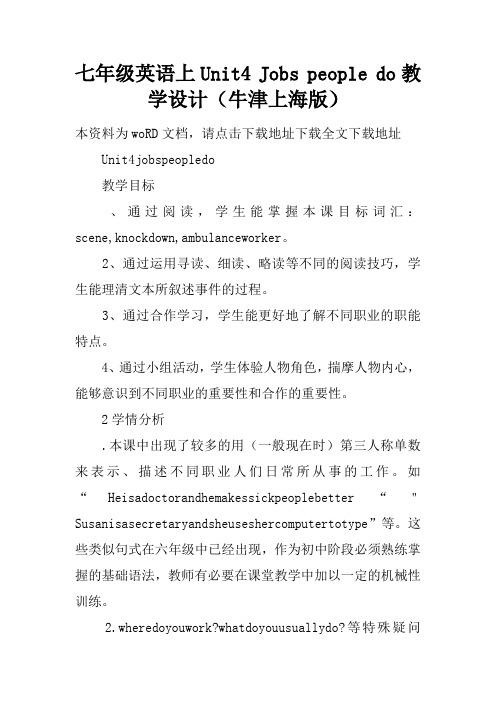
七年级英语上Unit4 Jobs people do教学设计(牛津上海版)本资料为woRD文档,请点击下载地址下载全文下载地址Unit4jobspeopledo教学目标、通过阅读,学生能掌握本课目标词汇:scene,knockdown,ambulanceworker。
2、通过运用寻读、细读、略读等不同的阅读技巧,学生能理清文本所叙述事件的过程。
3、通过合作学习,学生能更好地了解不同职业的职能特点。
4、通过小组活动,学生体验人物角色,揣摩人物内心,能够意识到不同职业的重要性和合作的重要性。
2学情分析.本课中出现了较多的用(一般现在时)第三人称单数来表示、描述不同职业人们日常所从事的工作。
如“Heisadoctorandhemakessickpeoplebetter“"Susanisasecretaryandsheuseshercomputertotype”等。
这些类似句式在六年级中已经出现,作为初中阶段必须熟练掌握的基础语法,教师有必要在课堂教学中加以一定的机械性训练。
2.wheredoyouwork?whatdoyouusuallydo?等特殊疑问句式在课文中出现用来引导学生对职业内涵的进一步阐述。
3重点难点学习重点:、了解不同职业的工作职责2、理清事件发展的逻辑顺序3、感悟各种职业的重要性以及体验分工合作的重要性学习难点:、准确使用一般过去时描述过去发生的行为2、运用合适的阅读技能4教学过程【导入】Pre-reading activity)watchavideoclipandhaveafriendlytalkaboutit.2)Talkaboutthepictureoftheaccident.通过欣赏一首jobssong,激发学生兴趣并引出主题。
对事故图片进行简单讨论,教授课文目标词汇:knockdown,scene。
【讲授】The accident)Scanthefirstparagraphtofillinthetable.2)Listentoaphonecallandmakeanewonetoreporttheaccide nt.通过寻读,填表格,了解事件发生起因;并通过打报警电话,在真实的语境中对事故有更好的了解。
牛津上海版英语七年级上Unit4 Jobs people do教案

牛津上海版英语七年级上Unit4 Jobspeople do教案In Unit 1.Jobs People Do。
there are several ___。
The use of the third person singular in the present simple tense to describe what people do in their daily work ___ in this unit。
For instance。
"He is a doctor and he makes sick people better" and "Susan is a secretary and she uses her computer to type." These structures are fundamental grammar rules that students should master in their middle school years。
Therefore。
teachers ___.nally。
this unit introduces a wide range of job titles and the uniforms associated with them。
Flash ns can be designed to train students to match different ___。
special interrogative structures such as "Where do you work?" and "What do you usually do?" are used in the text to guide students in understanding the job ns.At the end of this unit。
Jobspeopledo教案(通用2篇)

Jobs people do教案(通用2篇)Jobs people do 篇1module 2 my neibourhoodunit 1 jobs people dop28应掌握的词汇people n. 人民,人们 job n. 职业,工作hospital n. 医院 architect n. 建筑师properly adv. 适当地,严格地 builder n. 建筑工人mechanic n. 机械师,修理工 type v. 打字garage n. 汽车修理厂 repair v. 修理van n. 厢式送货车 drive v. 开车engine n. 引擎,发动机 secretary n. 秘书removal n. 搬迁 company n. 公司move v. 移动,搬动认知词汇neighbourhood n. 邻居 architecture n. 建筑proper adj. 适当的 machine n. 机器building n. 楼房,建筑物 minibus n. 小客车secret n. 秘密 type writer 打字员应掌握的短语jobs people do 人们的工作 do different jobs 做不同的工作in a hospital 在一家医院 make sick people better 使病人的健康状况好转take care of 照看,照顾 draw plans of buildings 绘制建筑图纸make sure 确信 in a garage 在修车厂repair cars 修理汽车 drive a fire engine 开一辆消防车put out fires 救火 rescue people 营救受难者wear a uniform 穿制服 use sth. to do 用某物来做某事type letters 打印信件 a removal man 一名搬运工人removal company 搬运公司 move sth. to spl 把某物搬到某地应掌握的句型①由and连接的并列句mrs wang is a doctor and she works in a hospital.②that引导的宾语从句she make sure that the builders build the blocks properly.teaching procedure:pre-task procedure①use pictures to revise jobs people do in sb7a.②group work. divide the ss in groups and let them discuss “people’s jobs” using the sentence pattern “what job does he/she do?”“where does he/she work?”“what does he/she usually do?”教学过程①using pict ures of a(an) doctor/architect/mechanic /fireman/secretary/removal man to lead in the mew language items.t: what job does he/she do?s: he/she is a(an) doctor/architect……t: where does he/she work?s: he/she works in a hospitalin an office/construction sitein a garageat a fire stationin an officeremoval companyt: what does he/she usually do?s: she/he makes sick people betterdraws plans of buildingsrepairs cars, vans and minibusputs out finesuses computer to type lettersmove people’s furnitur e to their new flat②pair work. ss have a conversation about this part. they should ask and answer freely.③listening and reading. make the ss repeat part i on page28 after the tape for 2 times. then fill in the blanks in part ii. after that check their answers.④teach the sentences that connect with “and”,the use of “make sure” .post-task activity①ss have a free talk about their mother or father.②exercises p157,p260homework. ss write a short composition about their parents. Jobs people do教案篇2module 2 my neibourhoodunit 1 jobs people dop32应掌握的词汇1.sweeper n. 清扫工2.work n. 工作3.sweep v.清扫4.empty v. 倒空5.bakery n. 面包店6.bake v.烤7.breakfast n. 早餐8.market n. 市场9.seller n.卖主10.fresh adj 新鲜的11.dinner n.晚餐12.empty adj. 空的13.newspaper n. 报纸认知词汇1.buyer n.买主2.baker n. 面包师应掌握的短语every morning 每天早晨street sweeper街道清扫工sweep the street 清扫街道 empty the rubbish bins 把垃圾箱倒空bake bread and cakes 烤面包和蛋糕buy sth. for breakfast/lunch/supper 买…作为早/中/晚餐buy sth. for sb. 为某人买某物 buy sth. for doing买…是为了干…sell newspapers 卖报纸on one’s way to spl.在去某地的路上flower shop 花店 flower market花市the vegetable and fruit seller蔬菜水果商buy fresh vegetables and fruit买新鲜的蔬菜和水果early in the morning 在大清早 do sth.early很早地做某事应掌握的句型see sb. doing sth.看见某人正在做某事1.simon sees the street sweepers doing their jobs.西蒙看见街道清扫工正在做他们的工作。
七上《unit1jobspeopledo》word教学设计教案
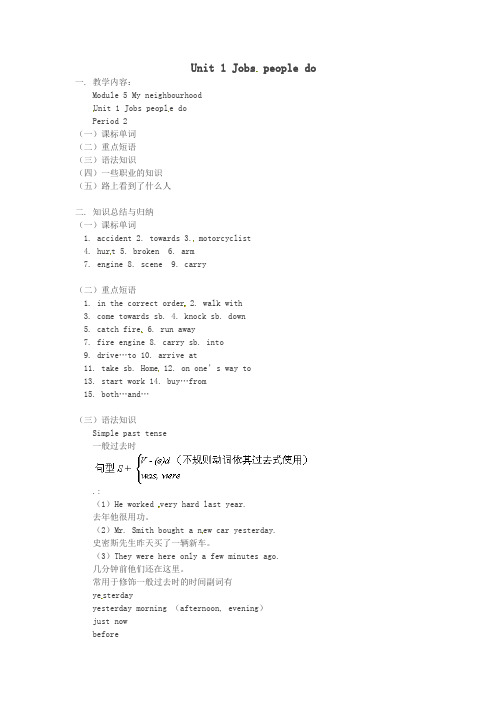
Unit 1 Jobs people do 一. 教学内容:Module 5 My neighbourhoodUnit 1 Jobs peopl e doPeriod 2(一)课标单词(二)重点短语(三)语法知识(四)一些职业的知识(五)路上看到了什么人二. 知识总结与归纳(一)课标单词1. accident2. towards3. motorcyclist4. hur t5. broken6. arm7. engine 8. scene 9. carry(二)重点短语1. in the correct order2. walk with3. come towards sb.4. knock sb. down5. catch fire6. run away7. fire engine 8. carry sb. into9. drive…to 10. arrive at11. take sb. Home12. on one’s way to13. start work 14. buy…from15. both…and…(三)语法知识Simple past tense一般过去时.:(1)He worked very hard last year.去年他很用功。
(2)Mr. Smith bought a n ew car yesterday.史密斯先生昨天买了一辆新车。
(3)They were here only a few minutes ago.几分钟前他们还在这里。
常用于修饰一般过去时的时间副词有ye sterdayyesterday morning (afternoon, evening)just nowbeforethen (at that time)last+时间(如 last week, month)时间+ago (如a few minutes ago, two weeks ago , years ago,… )只要所表达的时间与说话时的“现在”形成对立,就必须使用一般过去时来表达.:He was here only a few minutes ago.仅仅几分钟前他还在这里。
英语Module2Unit1Jobspeopledo第二课时教案(沈阳牛津七年级下)

Module 2 My neibourhoodUnit 1 Jobs people do第二课时一、分析(Analysis)(一)目标(Target)Where do you work ? What do you usually do ?等特殊疑问句式在课文中出现用来引导学生对职业内涵的进一步阐述。
(三)重点(Points)1 关键词:Conversation, lift, of course, answer, phone, meeting2 功能:Asking “Wh-“ questions to find out place, various kinds of information about a person-Where do you work?-What do you usually do?二、教学设计(Teaching Designs)教学内容:课本29页教学实施建议:这部分内容可选择让学生分别扮演Kitty和Susan两个不同角色,在全班前表演对话,其余学生则根据对话内容完成P29 上的问卷。
P29 的调查可作为学生回家的笔头作业。
几个处理建议教师可以在课堂上要求学生将这篇对话改编为小品或课本剧,并应用Where do you work? What do you usually do?的句式进行操练,在第二天的课堂上予以汇报。
P29 上的调查可作为学生的回家作业,让其调查父母亲戚的职业,按本页所示的问卷形式完成并进一步成文。
1.先和学生复习疑问词:where, what, why. 问:Where doyou live? What do you usually do atthe weekend? Why do you like ______ at the weekend? 引出回答:I live in/ on…2.播放录音:Read 学生边听边看课文。
3.学生两人一组,读Kitty和Susan的对话。
教学设计Jobs people do

1.Teacher introduces that jobs are very important to people.
2. Introduce six neighbors of Kitty and Ben’s to the students.
(1)David is a removal man
A: She is secretary.
Q: Can you say something about her job?
A: She works in an office. She uses computer to type letters.
1.Read the text fluently.
2.Interview students’ parents about their jobs then give the reports.
教学策略和手段:
1.情景创设
2.小组讨论
3.对话表演
教学程序
时间
Warming up
Revision
Pre-task preparation
Consolidation
教师活动
Play an advertisement
Ask students to play a game
1.Teacher gives the sentences
Students meet these neighbors one after another.
Students also learn the new vocabulary while meeting the neighbors. (The new vocabulary are on the slide)
牛津上海版英语七年级上册《Unit 4 Jobs people do》教学设计3

牛津上海版英语七年级上册《Unit 4 Jobs people do》教学设计3一. 教材分析《牛津上海版英语七年级上册》Unit 4 Jobs people do主要讨论人们的工作。
本单元包括一个单词列表,关于不同职业的词汇,以及一个关于职业梦想的对话。
通过本单元的学习,学生将能够理解不同职业的名称,描述自己和他人喜欢的职业,以及表达自己对未来职业的期望。
二. 学情分析七年级的学生已经具备了一定的英语基础,能够进行简单的日常交流。
但是,对于一些特定的职业名称和描述职业特点的词汇,他们可能还比较陌生。
因此,在教学过程中,需要注重词汇的讲解和操练,以及帮助学生运用目标语言进行实际交流。
三. 教学目标1.能够听懂、会说、会读、会写本单元的生词和重点句子。
2.能够描述自己和他人喜欢的职业,并表达对未来职业的期望。
3.能够运用目标语言进行简单的职业交流。
四. 教学重难点1.重点:本单元的生词和重点句子。
2.难点:特定职业名称的准确理解和运用,以及描述职业特点的词汇的运用。
五. 教学方法采用任务型教学法,通过各种互动活动,让学生在实际交流中掌握目标语言。
同时,运用分组合作、角色扮演等教学方法,增加学生的参与度和积极性。
六. 教学准备1.准备本单元的生词卡片。
2.准备与职业相关的图片或视频。
3.准备角色扮演的道具和背景。
七. 教学过程1.导入(5分钟)通过展示不同职业的图片或视频,引导学生谈论他们所知道的不同职业。
教师可以用问题引导学生进行思考,例如:“What jobs do you know?”、“What jobs do you think are interesting?”等。
2.呈现(10分钟)教师展示本单元的生词卡片,引导学生逐个学习和朗读。
同时,教师可以用简单的句子解释每个职业的特点,例如:“A teacher is a person who teaches students.”等。
3.操练(10分钟)学生分成小组,用所学的词汇和句子进行职业介绍。
牛津上海版英语七年级上册《Unit 4 Jobs people do》教学设计5

牛津上海版英语七年级上册《Unit 4 Jobs people do》教学设计5一. 教材分析牛津上海版英语七年级上册《Unit 4 Jobs people do》主要讨论人们从事的不同职业。
本单元通过介绍各种职业,使学生能够理解并运用相关词汇和句型,描述不同职业的特点和人们的职业选择。
教材内容丰富,贴近学生生活,有助于激发学生的学习兴趣,提高他们的英语水平。
二. 学情分析七年级的学生已经掌握了基本的英语语法和词汇,具备一定的听说读写能力。
他们对新鲜事物充满好奇,善于模仿和探究。
然而,部分学生可能在开口说英语方面存在恐惧心理,需要教师多给予鼓励和机会。
此外,学生对于不同职业的认识和理解程度不一,教师应充分考虑这一因素,在教学中引导学生互相分享和交流。
三. 教学目标1.知识目标:学生能够掌握本单元的重点词汇和句型,正确运用它们描述不同职业的特点和人们的职业选择。
2.能力目标:学生能够在日常生活中运用英语进行简单的职业交流,提高他们的听说读写能力。
3.情感目标:通过学习,学生能够认识到各种职业的重要性,尊重他人的职业选择,培养良好的职业观念。
四. 教学重难点1.重点:本单元的重点词汇和句型,如:doctor, teacher, police officer等职业词汇以及描述职业特点的句型。
2.难点:如何运用所学知识进行实际职业交流,以及如何正确表达自己的职业观念。
五. 教学方法1.任务型教学法:通过设计各种任务,让学生在实践中运用英语,提高他们的语言能力。
2.情境教学法:创设真实的生活情境,让学生在情境中学习英语,增强学习兴趣。
3.合作学习法:鼓励学生互相合作,共同完成学习任务,培养团队精神。
六. 教学准备1.教师准备:提前熟悉教材内容,了解学生的学习状况,设计合理的教学方案。
2.学生准备:预习本单元内容,了解相关职业知识,准备进行课堂交流。
七. 教学过程1.导入(5分钟)教师通过提问方式引导学生谈论他们熟悉的职业,如:What jobs do your parents do? 让学生自由回答,从而激发学生的学习兴趣。
牛津上海版七年级英语上册优秀教学案例:Unit4Jobspeopledo

(三)学生小组讨论
1.教师组织学生进行小组讨论,让学生分享自己父母的职业,互相交流和介绍不同职业的特点和职责。
2.教师提出问题,引导学生进行小组讨论,如"What do you think are the advantages and disadvantages of your parents' jobs?"和"How has your parents' job influenced your life?",让学生深入思考和探讨。
(二)讲授新知
1.教师引导学生学习本单元的核心词汇,如"doctor," "teacher," "nurse," "farmer," "scientist,"等,并通过例句和练习帮助学生理解和运用这些词汇。
2.教师讲解本单元的句型和语法,如"What does your mother/father do?"和"She/He is a teacher/doctor/farmer,"并通过对话练习让学生熟练掌握和运用。
(五)作业小结
1.教师布置相关的作业,让学生运用本节课所学的知识和技能,进行实际的练习和应用。
2.教师提醒学生在作业中注意运用所学的词汇和句型,并要求学生在完成作业后进行自我检查和修改。
3.教师鼓励学生在课后进行进一步的学习和探索,如通过采访家人或朋友了解更多的职业信息,拓宽自己的知识视野。
五、案例亮点
(二)问题导向
1.设计一系列问题,引导学生思考和探讨不同职业的优缺点、工作环境、发展前景等,激发学生的思考和探究欲望。
新牛津上海版英语七年级上册《unit 1 jobs people do》优秀教案2篇(重点资料).doc
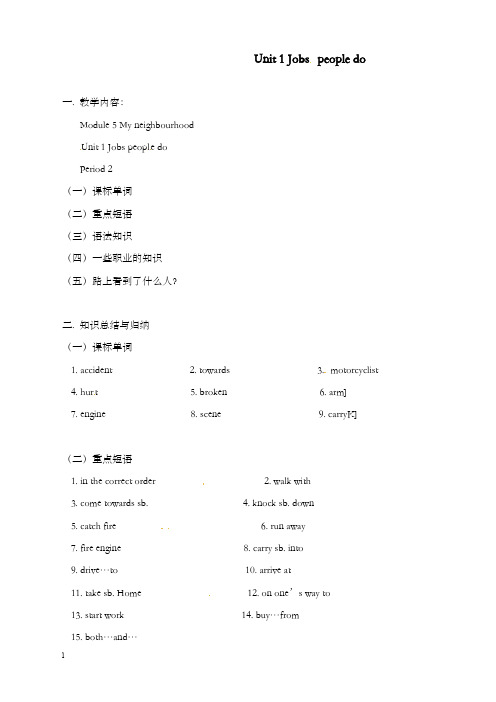
Unit 1 Jobs people do一. 教学内容:Module 5 My neighbourhoodUnit 1 Jobs people doPeriod 2(一)课标单词(二)重点短语(三)语法知识(四)一些职业的知识(五)路上看到了什么人?二. 知识总结与归纳(一)课标单词1. accident2. towards3.motorcyclist4. hurt5. broken6. arm]7. engine 8. scene 9. carryK](二)重点短语1. in the correct order2. walk with3. come towards sb.4. knock sb. down5. catch fire6. run away7. fire engine 8. carry sb. into9. drive…to 10. arrive at11. take sb. Home 12. on one’s way to13. start work 14. buy…from15. both…and…(三)语法知识Simple past tense一般过去时e.g.:(1)He worked very hard last year.去年他很用功。
(2)Mr. Smith bought a n ew car yesterday.史密斯先生昨天买了一辆新车。
(3)They were here only a few minutes ago.几分钟前他们还在这里。
常用于修饰一般过去时的时间副词有yesterdayyesterday morning (afternoon, evening)just nowbeforethen (at that time)last+时间(如last week, month)时间+ago (如a few minutes ago, two weeks ago , years ago,…)只要所表达的时间与说话时的“现在”形成对立,就必须使用一般过去时来表达e.g.:He was here only a few minutes ago.仅仅几分钟前他还在这里。
牛津上海版英语七年级上Unit4 Jobs people do教案
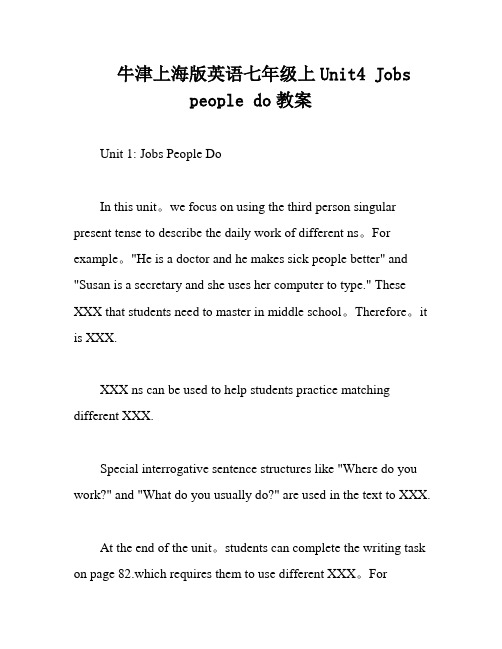
牛津上海版英语七年级上Unit4 Jobspeople do教案Unit 1: Jobs People DoIn this unit。
we focus on using the third person singular present tense to describe the daily work of different ns。
For example。
"He is a doctor and he makes sick people better" and "Susan is a secretary and she uses her computer to type." These XXX that students need to master in middle school。
Therefore。
it is XXX.XXX ns can be used to help students practice matching different XXX.Special interrogative sentence structures like "Where do you work?" and "What do you usually do?" are used in the text to XXX.At the end of the unit。
students can complete the writing task on page 82.which requires them to use different XXX。
Forexample。
"Henry is a mechanic and he works in a garage" and "David is a removal man and he works for a removal company."Students are also encouraged to use the present simple XXX should emphasize the use of the third person singular present tense。
初中英语备课参考 Jobs people do

Module 5 Unit 1 Jobs people do要点精讲pany公司neighborhood邻居doctor医生make使成为(变成);做;制造sick people 病人better更好的护士waiter服务员bring带来letter信shop assistant店员sell卖job工作2. What job do you do?你是做什么工作的?询问对方的工作还可以有以下表达法:What are you? What do you do? What do you work?3.Why...?问句强调发生某一动作或产生某一情况的原因。
通常我们用because来回答why. . .?问句。
如:"Why do you like P.E.?" "Because it's fun."“你为什么喜欢体育?”“因为体育有趣。
”"Why are you so angry?" "Because I didn't pass the maths test."“你为什么这么生气?”“因为我数学考试没及格。
”4.What ... for?问句强调什么目的或用途,回答时不用because,而要用表示目的的不定式、for介词短语或其他形式。
如:"What do you buy that for?" "To make pumpkin pie for Thanksgiving dinner.”“你买那东西干什么用?”“为感恩节晚饭做南瓜馅饼。
”"What do you come back for?" "I'm back for my textbook."“你回来干吗?’’“我回来拿课本。
”【注】反过来说,如果对句中表示目的的不定式或介词短语进行提问时,应该用what... for?问句,而不用Why问句。
牛津上海版英语七年级上册《Unit4Jobspeopledo》说课稿5

牛津上海版英语七年级上册《Unit 4 Jobs people do》说课稿5一. 教材分析《Unit 4 Jobs people do》是牛津上海版英语七年级上册的一单元,本单元主要讨论人们的工作。
教材通过不同职业的介绍,让学生们了解到各种工作的内容和特点,同时培养他们的听说读写技能。
本单元的话题贴近学生的生活,能够激发他们的学习兴趣,提高他们的学习积极性。
二. 学情分析七年级的学生已经掌握了一定的英语基础知识,具备一定的听说读写能力。
但学生在语言表达方面还存在一定的问题,如词汇量不足,语法运用不准确等。
此外,学生的学习兴趣和积极性对他们的学习效果有很大影响。
因此,在教学过程中,教师需要关注学生的个体差异,充分调动他们的学习积极性。
三. 说教学目标1.知识目标:让学生掌握与职业相关的词汇和表达方式,如doctor,teacher, engineer等。
2.技能目标:培养学生听说读写的能力,使他们能够运用所学知识进行日常交流。
3.情感目标:培养学生对各种职业的尊重和理解,提高他们的职业规划意识。
四. 说教学重难点1.重点:让学生掌握与职业相关的词汇和表达方式。
2.难点:引导学生运用所学知识进行实际交流,提高他们的语言运用能力。
五. 说教学方法与手段1.交际法:通过模拟真实场景,让学生在实际交流中运用所学知识。
2.任务型教学法:通过完成不同任务,培养学生听说读写的能力。
3.多媒体辅助教学:利用多媒体课件和视频,提高学生的学习兴趣。
六. 说教学过程1.导入:教师通过展示不同职业的图片,引导学生谈论各自父母或亲戚的职业,激发学生的学习兴趣。
2.新课呈现:教师介绍本节课的主要内容,让学生听录音,模仿发音,学习新词汇。
3.课堂活动:教师学生进行小组讨论,让他们用所学词汇和表达方式介绍自己的理想职业。
4.巩固练习:教师设计不同难度的练习题,让学生进行听力、口语、阅读和写作的训练。
5.课堂小结:教师对本节课的内容进行总结,强调重点词汇和表达方式。
牛津上海版英语七年级上册《Unit 4 Jobs people do》教学设计6

牛津上海版英语七年级上册《Unit 4 Jobs people do》教学设计6一. 教材分析牛津上海版英语七年级上册《Unit 4 Jobs people do》主要介绍了不同职业的特点和人们对于不同职业的看法。
通过本单元的学习,学生能够掌握与职业相关的词汇和表达方式,并能够运用所学知识进行简单的交流和描述。
本单元包括两个语篇,分别是“What do you want to be when you grow up?”和“I want to be an actor”。
二. 学情分析七年级的学生已经具备了一定的英语基础,能够进行简单的听、说、读、写操作。
然而,对于一些特定的职业词汇和表达方式可能还不够熟悉。
因此,在教学过程中,需要注重词汇的引入和操练,同时激发学生的兴趣,让他们能够主动参与课堂活动。
三. 教学目标1.知识目标:学生能够掌握与职业相关的词汇和表达方式,理解语篇的内容,并能够进行简单的交流和描述。
2.能力目标:学生能够通过听、说、读、写的方式,运用所学知识进行实际的交流和表达。
3.情感目标:学生能够对不同的职业有更全面的了解,培养对各种职业的尊重和认识。
四. 教学重难点1.重点:职业词汇的掌握和运用,语篇内容的理解。
2.难点:对于一些特定职业的表达方式,如何运用所学知识进行实际的交流。
五. 教学方法1.任务型教学法:通过设计各种任务,让学生在实际的语言环境中进行听、说、读、写的操作,提高他们的语言运用能力。
2.情境教学法:创设各种职业情境,让学生在情境中感受和理解职业词汇和表达方式。
3.小组合作学习:通过小组讨论和合作,培养学生的团队协作能力,提高他们的语言交流能力。
六. 教学准备1.教师准备:准备好语篇材料,制作相关的教学课件和教具。
2.学生准备:学生提前预习语篇,了解基本的职业词汇。
七. 教学过程1.导入(5分钟)通过向学生展示一些职业图片,引导学生谈论自己或家人的职业,激发学生的兴趣和话题。
- 1、下载文档前请自行甄别文档内容的完整性,平台不提供额外的编辑、内容补充、找答案等附加服务。
- 2、"仅部分预览"的文档,不可在线预览部分如存在完整性等问题,可反馈申请退款(可完整预览的文档不适用该条件!)。
- 3、如文档侵犯您的权益,请联系客服反馈,我们会尽快为您处理(人工客服工作时间:9:00-18:30)。
Module 2 My neibourhood
Unit 1 Jobs people do
P28
应掌握的词汇
people n. 人民,人们job n. 职业,工作
hospital n. 医院architect n. 建筑师
properly adv. 适当地,严格地builder n. 建筑工人
mechanic n. 机械师,修理工type v. 打字
garage n. 汽车修理厂repair v. 修理
van n. 厢式送货车drive v. 开车
engine n. 引擎,发动机secretary n. 秘书
removal n. 搬迁company n. 公司
move v. 移动,搬动
认知词汇
neighbourhood n. 邻居architecture n. 建筑
proper adj. 适当的machine n. 机器
building n. 楼房,建筑物minibus n. 小客车
secret n. 秘密type writer 打字员
应掌握的短语
jobs people do 人们的工作do different jobs 做不同的工作
in a hospital 在一家医院make sick people better 使病人的健康状况好转
take care of 照看,照顾draw plans of buildings 绘制建筑图纸
make sure 确信in a garage 在修车厂
repair cars 修理汽车drive a fire engine 开一辆消防车
put out fires 救火rescue people 营救受难者
wear a uniform 穿制服use sth. to do 用某物来做某事
type letters 打印信件 a removal man 一名搬运工人
removal company 搬运公司move sth. to spl 把某物搬到某地
应掌握的句型
①由and连接的并列句
Mrs Wang is a doctor and she works in a hospital.
②that引导的宾语从句
She make sure that the builders build the blocks properly.
Teaching procedure:
Pre-task procedure
①Use pictures to revise jobs people do in SB7A.
②Group work. Di vide the Ss in groups and let them discuss “People’s jobs” using the sentence pattern “what job does he/she do?”
“Where does he/she work?”
“What does he/she usually do?”
教学过程
①Using pictures of a(an) doctor/architect/mechanic /fireman/secretary/removal man to lead in the mew language items.
T: What job does he/she do?
S: He/she is a(an) doctor/architect……
T: where does he/she work?
S: He/she works in a hospital
in an office/construction site
in a garage
at a fire station
in an office
removal company
T: what does he/she usually do?
S: She/he makes sick people better
draws plans of buildings
repairs cars, vans and minibus
puts out fines
uses computer to type letters
move people’s furniture to their new flat
②Pair work. Ss have a conversation about this part. They should ask and answer freely.
③Listening and reading. Make the Ss repeat Part I on Page 28 after the tape for 2 times. Then fill in the blanks in Part II. After that check their answers.
④Teach the sentences that connect with “and”,the use of “make sure” .
Post-task activity
①Ss have a free talk about their mother or father.
②Exercises P157,P260
Homework. Ss write a short composition about their parents.。
